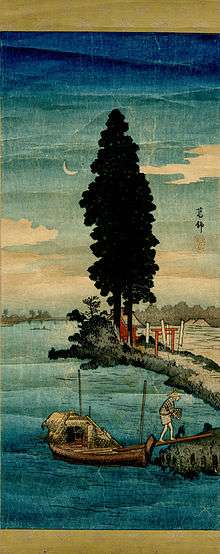Shōzaburō Watanabe

Shōzaburō Watanabe (渡辺 庄三郎 Watanabe Shōzaburō, June 2, 1885 – February 14, 1962) was a Japanese print publisher and the driving force behind the Japanese printmaking movement known as shin-hanga ("new prints").
Biography
He started his career working for the export company of Kobayashi Bunshichi, which gave him an opportunity to learn about exporting art prints. In 1908, Watanabe married Chiyo, a daughter of the woodblock carver Chikamatsu.[1][2]
Watanabe employed highly skilled carvers and printers, and commissioned artists to design prints that combined traditional Japanese techniques with elements of contemporary Western painting, such as perspective and shadows. Watanabe coined the term shin-hanga in 1915 to describe such prints. Charles W. Bartlett, Hashiguchi Goyō, Kawase Hasui, Yoshida Hiroshi, Kasamatsu Shirō, Torii Kotondo, Ohara Koson, Terashima Shimei, Itō Shinsui, Takahashi Shōtei and Yamakawa Shūhō are among the artists whose works he published.[3]
Much of his company's stockpile of both prints and their original printing-blocks was destroyed in the Great Kantō earthquake of 1923. In the following years, new versions of many of these prints were created, using re-carved blocks; typically, the re-issued "post-quake" prints included changes and revisions in the designs.
Watanabe exported most of his shin-hanga prints to the United States and Europe due to a lack of Japanese interest. After the close of World War II, his heirs continued the business, which still operates.
References
- Machida Shiritsu Kokusai Hanga Bijutsukan, Taishō jojō shinhanga no bi ten, Watanabe Shōzaburō to shinhanga undō, Tokyo, Machida-shi, Machida Shiritsu, Kokusai Hanga Bijutsukan, 1989.
- Miles, Richard and Jennifer Saville, A Printmaker in Paradise, The Art and Life of Charles W. Bartlett, with a catalogue raisonné of etchings and color woodblock prints, Honolulu, Hawaii, Honolulu Academy of Arts, 2001